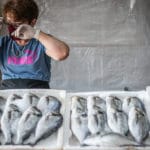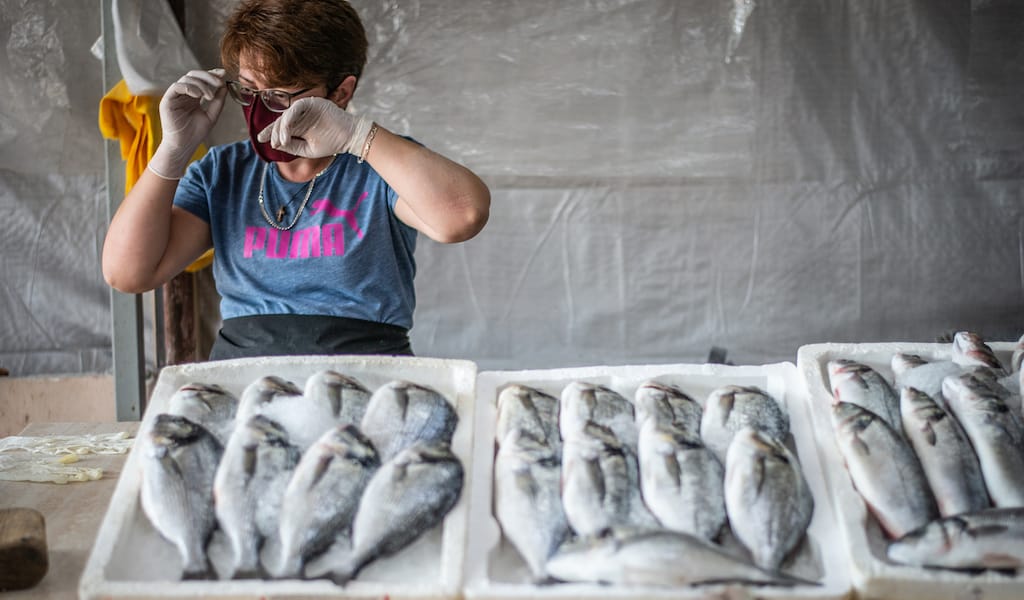Misty, lush Fırtına Valley is worlds away from Istanbul’s concrete urban hustle. It’s a land of cascading waterfalls, rushing rivers, wild edibles and precipitous hillsides covered with glossy tea bushes. We came to escape Istanbul’s infamous August heat and learn about the region’s special foods. After a week, we had stomped our way through bagpipe-fueled celebratory circle dances and eaten our weight in fried trout and cornbread.
Thirty-five miles up Fırtına Valley from the Black Sea coast is the small town of Çamlıhemşin, where we met up with Özlem Erol, the proprietor of Moyy Mini Hotel and café. Her family is from the area, and after a decade working in Istanbul, she came back to her roots. Erol graciously shared her knowledge about the region’s specialties with us on Moyy’s riverfront balcony.
Tea is the region’s most important source of income. Cultivation began in the 1970s, and two years ago the valley started to produce all organic tea. Surprisingly, it was large tea companies, like supermarket-shelf staple Çaykur, that first advocated for organic production, concerned that pesticides were destroying the soil and therefore the tea plants. Women harvest the leaves two to three times a year with a special curved blade and pack the leaves into large backpacks. Zip lines run up and down the tea slopes so women can transport the large sacks to trucks. They receive one lira (46 cents) per kilo of leaves. No processing or fermentation happens in the valley, although Erol says that would be a great future project, to establish the valley’s own niche tea company.

Honey harvesting, another local specialty, is a dicey art form here. Beekeepers place round linden wood (the bees like the smell) hives, known as karakovan, in isolated forest treetops. Some regions, like the Palovit Valley, aren’t accessible by roads, so beekeepers carry all the hives and ropes (for scaling trees) on foot. Native kavkaz bees feast on pollen from diverse flowers to create a range of exquisite honeys. Erol’s favorite is the dark amber, slightly bitter chestnut honey. We sampled some on warm cornbread, and even a bee came by for a taste. Rhododendron honey is called deli bal (“crazy honey”) because the flowers are toxic and can give eaters a slight high, or make them sick. We also tasted yayla bal (“plateau honey”) from Ayder, a town at the base of the Kaçkar mountains. It is a pale yellow, rich honey with delicate flavors from high plateau flowers.
This honey does not come cheap, retailing for $100-$250 per kilo. Beekeeper cooperatives around the valley keep quality high, and set prices based on the quantity produced each year. By chance, we ran into veteran beekeeper Yusuf Coşkun, who is known for his deep knowledge and love for his craft. “This year is a bad honey year because it snowed on the June flowers,” Coşkun lamented. “People are coming to me wanting to buy honey, but there is not enough.” Coşkun also has to fend off bears from eating all his honey and says, “So far mobile electric fences are working well.” The local honey’s high price tag was becoming more understandable.
Cows and their dairy products are also staples of local cuisine. During the summer, villagers bring their small cows to plateaus at least 2,000 meters (6,561 feet) high. They graze on flowers until October, when they return to the villages before it snows. This practice is going out of fashion, as kids move to the cities and older herders set down their staffs. Luckily for Erol, her aunt has taken up the craft, and is supplying mountain pasture, fresh yogurt and herby cheeses to Moyy. We sampled the local dairy products in a fondue-like concoction called muhlama, which is a dangerously rich pot of melted cheese, corn flour and butter.
Villagers plant corn, beans and squash in every possible accessible nook along the valley floor and steep hillsides. Due to the rich soil and consistent rainfall, the crops are massive and vibrant. Wild chestnuts, mushrooms, walnuts and berries add to the Garden of Eden vibe. Erol says you can also eat what the cows forage, so pay attention to what they munch. She will collect wild blueberries, raspberries and blackberries in the high plateau soon to make preserves and liqueurs. The variety of wild edibles also feeds a healthy bear population. Every night, the neighborhood bear strips Erol’s mom’s bean plants. Maybe that is why crops are tucked all over the place – for insurance.
Fırtına Valley seems too beautiful to be true, and unfortunately it is vulnerable, explains Erol. Locals are constantly fighting hydroelectric companies that, encouraged by increasingly lax environmental regulations, are trying to build dams on the river. Mass tourism, with its steady stream of tour buses, leaves trash and little cultural engagement in its wake. Villagers say they need support from the government and NGOs in order to learn ways to preserve their culture and incorporate it with tourism, so both can flourish. If you go, take the time to learn about the valley’s cultural history, and try a warm morning kete (cornmeal and honey-filled pastry) instead of a candy bar.
 October 6, 2023 Harvest Week
October 6, 2023 Harvest Week
Let us begin with a little Greek mythology. Hermes – son of Zeus, god of thieves and […] Posted in Athens August 30, 2021 CB on the Road
August 30, 2021 CB on the Road
In 2013, Anthony Bourdain and the Parts Unknown team arrived in Batumi, the capital of […] Posted in Tbilisi October 5, 2019 Wine Harvest Week
October 5, 2019 Wine Harvest Week
Zeynep Arca Şallıel had a successful career in advertising in Istanbul, but in 1995 she […] Posted in Istanbul
Published on August 28, 2014
Related stories
October 6, 2023
Athens | By Ilias Fountoulis
AthensLet us begin with a little Greek mythology. Hermes – son of Zeus, god of thieves and commerce and messenger of Olympus – and Krokos, a mortal youth, were best friends. One day, while the two friends were practicing their discus throwing, Hermes accidentally hit Crocus on the head and wounded him fatally. On the…
August 30, 2021
TbilisiIn 2013, Anthony Bourdain and the Parts Unknown team arrived in Batumi, the capital of Adjara, to shoot the first segment of their Georgian adventure. The show’s producers invited Zamir Gotta, a Russian sidekick unfamiliar with the city, to join him. They visited a casino, strip club and mediocre restaurant for khashi, tripe soup, which…
October 5, 2019
IstanbulZeynep Arca Şallıel had a successful career in advertising in Istanbul, but in 1995 she decided to take on a daunting new challenge: taking part in the revival of small-scale viniculture in the ancient winemaking region of Thrace.“I wanted to do something with soil, something that mattered a little bit more,” she says. Her father…

















































































